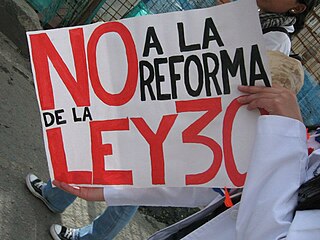
The Velvet Revolution or Gentle Revolution was a non-violent transition of power in what was then Czechoslovakia, occurring from 17 November to 28 November 1989. Popular demonstrations against the one-party government of the Communist Party of Czechoslovakia included students and older dissidents. The result was the end of 41 years of one-party rule in Czechoslovakia, and the subsequent dismantling of the command economy and conversion to a parliamentary republic.

Beginning in late 2002 and continuing after the 2003 invasion of Iraq, large-scale protests against the Iraq War were held in many cities worldwide, often coordinated to occur simultaneously around the world. After the biggest series of demonstrations, on February 15, 2003, New York Times writer Patrick Tyler claimed that they showed that there were two superpowers on the planet: the United States and worldwide public opinion.

Student activism or campus activism is work by students to cause political, environmental, economic, or social change. In addition to education, student groups often play central roles in democratization and winning civil rights.

The Organising Bureau of European School Student Unions (OBESSU) is the umbrella organization of 36 national school student unions from 24 European countries. An interlocutor with the European Commission, European Parliament, Council of Europe and UNESCO, OBESSU is a full member of the Lifelong Learning Platform (LLLP) and the European Youth Forum (YFJ), and an associate member of the European Students' Union.
The European Students' Union (ESU) is the umbrella organisation of 44 national unions of students from 40 countries, representing almost 20 million students. A consultative member of the Bologna Process, ESU is also a full member of the European Youth Forum (YFJ).

The proposed invasion of Afghanistan prompted protests with mass demonstrations in the days leading up to the official launch of the war on October 7, 2001. The continuation of the war in Afghanistan from 2001 to 2021 lead to further protest and opposition to hostilities.
International Students' Day is an international observance of the student community, held annually on 17 November. Originally commemorating the Czech universities which were stormed by Nazis in 1939 and the students who were subsequently killed and sent to concentration camps, it is now marked by a number of universities, sometimes on a day other than 17 November, as a nonpolitical celebration of the multiculturalism of their international students.

The University Students' Council, also known in abbreviation as KSU, is a Maltese national students' union. It is the oldest extant student organization in Europe. The KSU was established by Arturo Mercieca (1878-1969), later Chief Justice Sir Arturo Mercieca (1924-1940), in 1901 as the Comitato Permanente Universitario, also previously known as University Permanent Committee. The students union is involved in students' national and international politics.
The Browne Review or Independent Review of Higher Education Funding and Student Finance was a review to consider the future direction of higher education funding in England.
The 2010–2011 University of Puerto Rico strikes (UPR) refer to the student strikes which took place between May 2010 and June 2010 in ten of the university system's eleven constituent institutions, as well as the protests that occurred from October 2010 to February 2011.
The anti-austerity movement refers to the mobilisation of street protests and grassroots campaigns that has happened across various countries, especially in Europe, since the onset of the worldwide Great Recession.

The 2010 United Kingdom student protests were a series of demonstrations in November and December 2010 that took place in several areas of the country, with the focal point of protests being in central London. Largely student-led, the protests were held in opposition to planned spending cuts to further education and an increase of the cap on tuition fees by the Conservative–Liberal Democrat coalition government following their review into higher education funding in England. Student groups said that the intended cuts to education were excessive, would damage higher education, give students higher debts, and broke campaign promises made by politicians.

The 2011–2013 Chilean protests – known as the Chilean Winter or the Chilean Education Conflict – were a series of student-led protests across Chile, demanding a new framework for education in the country, including more direct state participation in secondary education and an end to the existence of profit in higher education. Currently in Chile, only 45% of high school students study in traditional public schools and most universities are also private. No new public universities have been built since the end of the Chilean transition to democracy in 1990, even though the number of university students has increased.

Occupy San Francisco was a collaboration that began with a demonstration event located at Justin Herman Plaza in the Embarcadero and in front of the Federal Reserve building on Market Street in the Financial District in San Francisco, California. It is based on the Occupy Wall Street movement that began in New York City on September 17, 2011 and is one of several "Occupy" protest sites in the San Francisco Bay Area; other sites include Occupy Oakland and Occupy San Jose.

The 2011 Colombian student protests consisted of a series of demonstrations led by students, some teachers, university employees, and unions, starting on October 12. These demonstrations took place throughout the Colombian territory in protest against the draft of the Higher Education Reform Project presented by the National Government to the Congress of the Republic in October 2011.

The 2012 Quebec student protests (movement) were a series of student protests led by students individually such as the Association pour une solidarité syndicale étudiante (ASSÉ), the Fédération étudiante universitaire du Québec, and the Fédération étudiante collégiale du Québec against a proposal by the Quebec Cabinet, headed by Liberal Premier Jean Charest, to raise university tuition from $2,168 to $3,793 between 2012 and 2018. As part of the protest movement, a series of widespread student strikes were organized, involving half of Quebec's student population by April 2012. A third of Québécois students continued to participate in the strike by its 100th day, while a quarter million had participated during its peak. Other students continued to attend their courses.
The National Campaign Against Fees and Cuts (NCAFC) or Student Left Network is a membership-based organisation of activist students and education workers campaigning against tuition fees, education cuts and privatisation in the United Kingdom.

The Cooper Union financial crisis and tuition protests constitute the events surrounding Cooper Union's announcement that they would begin charging tuition after being a tuition-free school for most of its history. The possible mismanagement of the school's finances and the subsequent reactions of students, faculty, alumni and organized protest groups attracted widespread media attention. Activist groups staged a series of occupations and protests demanding the resignation of the school president, Jamshed Bharucha, promoting a vote of no confidence in Bharucha and the school's Board Chair, Mark Epstein, both of whom resigned in 2015, and insisting that the administration address the concerns of students, faculty, alumni, and the public, and alternate plans to avoid having the school charging tuition.

2015 protests in Venezuela began in the first days of January primarily due to shortages in the country, with the first massive demonstration occurring on 23 January, on the anniversary of the 1958 coup d'etat against dictator Marcos Pérez Jiménez. The series of protests originally began in February 2014 when hundreds of thousands of Venezuelans protested due to high levels of criminal violence, inflation, and chronic scarcity of basic goods because of policies created the Venezuelan government. As of January 2015, over 50 people had been arrested for protesting. The protests are listed below according to the month they had happened.

Rete degli Studenti Medi is an Italian high-school students' union, created 4 October 2008 from three other student associations active in Italy during the first years of the 21st century.:













